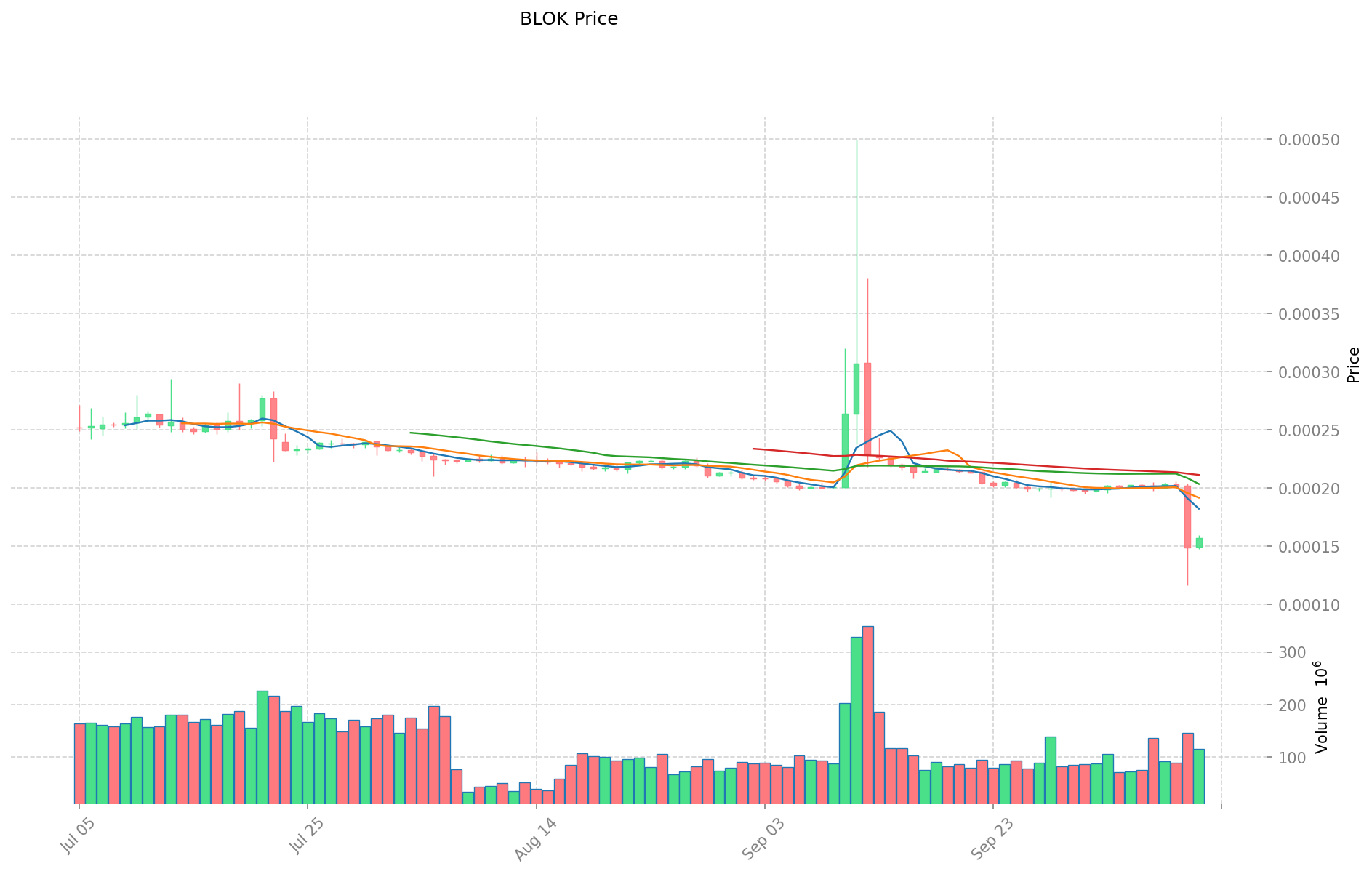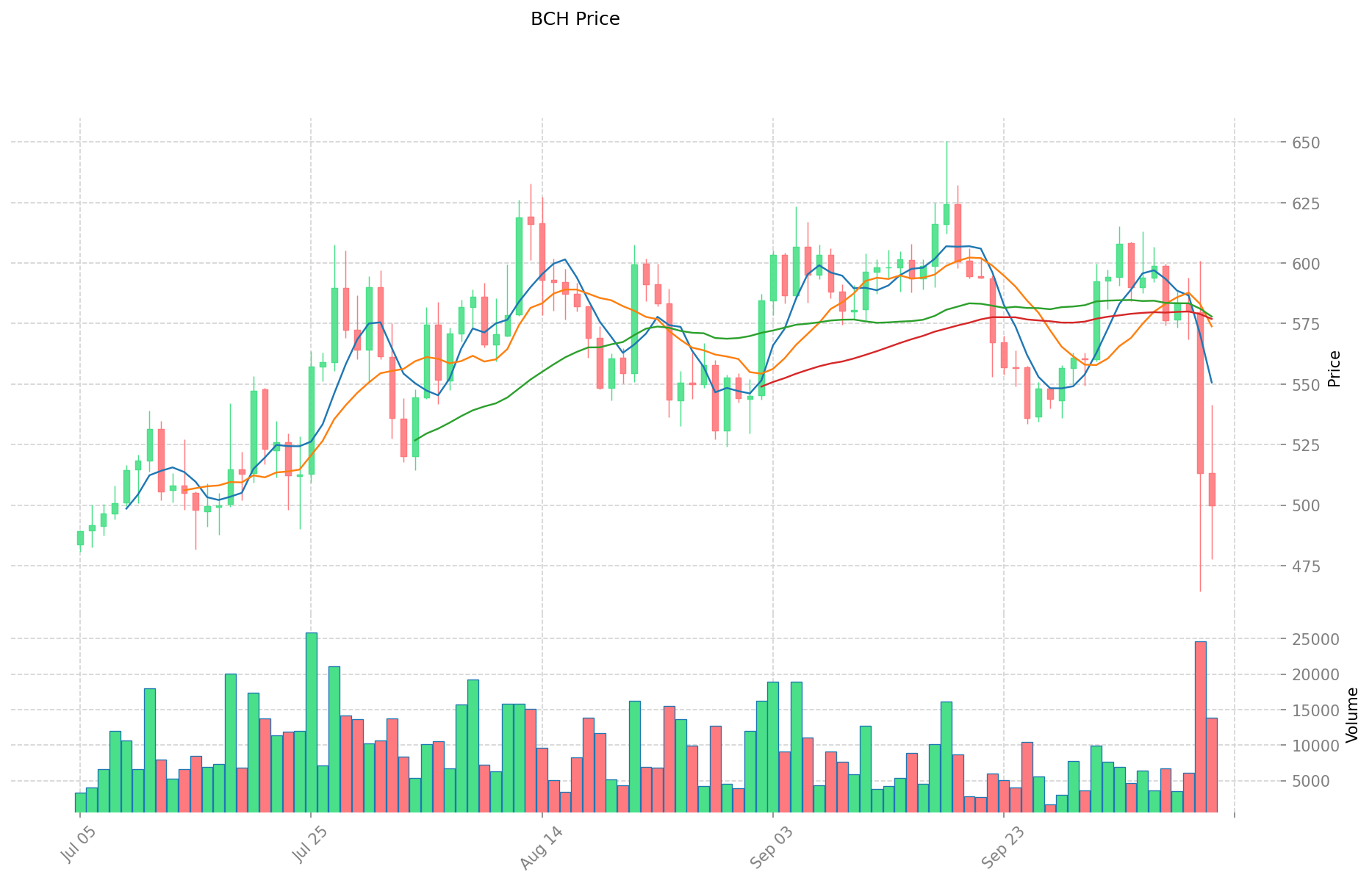BLOK vs BCH: A Comparative Analysis of Two Cryptocurrencies in the Digital Asset Landscape
Introduction: BLOK vs BCH Investment Comparison
In the cryptocurrency market, the comparison between Bloktopia (BLOK) and Bitcoin Cash (BCH) has been an unavoidable topic for investors. The two not only show significant differences in market cap ranking, application scenarios, and price performance but also represent different positioning in the crypto asset space.
Bloktopia (BLOK): Launched in 2021, it has gained market recognition for its innovative VR experience in the cryptocurrency community.
Bitcoin Cash (BCH): Since its inception in 2017, it has been hailed as a "peer-to-peer electronic cash system," and is one of the cryptocurrencies with high global trading volume and market capitalization.
This article will comprehensively analyze the investment value comparison between BLOK and BCH, focusing on historical price trends, supply mechanisms, institutional adoption, technological ecosystems, and future predictions, attempting to answer the question most concerning to investors:
"Which is the better buy right now?" I. Price History Comparison and Current Market Status
BLOK (Coin A) and BCH (Coin B) Historical Price Trends
- 2021: BLOK reached its all-time high of $0.178281 during the bull market.
- 2017: BCH was created through a Bitcoin hard fork, with an initial price of $555.89.
- Comparative analysis: In the recent market cycle, BLOK dropped from its peak of $0.178281 to a low of $0.00013019, while BCH declined from its all-time high of $3,785.82 to a low of $76.93.
Current Market Situation (2025-10-12)
- BLOK current price: $0.0001572
- BCH current price: $498.36
- 24-hour trading volume: $18,182.16 (BLOK) vs $6,962,738.49 (BCH)
- Market Sentiment Index (Fear & Greed Index): 24 (Extreme Fear)
Click to view real-time prices:
- View BLOK current price Market Price
- View BCH current price Market Price


II. Key Factors Influencing BLOK vs BCH Investment Value
Supply Mechanism Comparison (Tokenomics)
- BCH: Fixed supply cap of 21 million coins, similar to Bitcoin's supply model with halving mechanism
- 📌 Historical Pattern: The limited supply of BCH has contributed to price volatility, with significant price movements following regulatory developments.
Institutional Adoption and Market Applications
- Institutional Holdings: BCH is gaining institutional recognition, with EDX Markets (backed by Wall Street financial institutions) listing BCH as one of only four cryptocurrencies not classified as securities
- Enterprise Adoption: BCH shows growing adoption in payment systems due to its larger block size and lower transaction fees
- Regulatory Policies: BCH has received favorable regulatory treatment in the US, with the SEC classifying it as a non-security, unlike many competing blockchain tokens
Technical Development and Ecosystem Building
- BCH Technical Development: 32MB block size (compared to BTC's smaller blocks) enables processing more transactions per block, providing scalability advantages
- Ecosystem Comparison: BCH is positioned primarily as a payment-focused cryptocurrency rather than a value storage asset, with growing smart contract functionality
Macroeconomic Factors and Market Cycles
- Inflation Environment Performance: BCH has shown growth potential in periods of market uncertainty, particularly when regulatory factors favor compliant cryptocurrencies
- Macroeconomic Monetary Policy: Market sentiment and crypto market trends significantly influence BCH price movements
- Geopolitical Factors: BCH benefits from access to the US market, unlike many competing cryptocurrencies classified as securities that face trading restrictions
III. 2025-2030 Price Prediction: BLOK vs BCH
Short-term Prediction (2025)
- BLOK: Conservative $0.000147768 - $0.0001572 | Optimistic $0.0001572 - $0.000232656
- BCH: Conservative $471.333 - $496.14 | Optimistic $496.14 - $684.6732
Mid-term Prediction (2027)
- BLOK may enter a growth phase, with projected prices of $0.0001709323632 - $0.000277187616
- BCH may enter a steady appreciation phase, with projected prices of $619.77932835 - $737.21120109
- Key drivers: Institutional fund inflows, ETF developments, ecosystem growth
Long-term Prediction (2030)
- BLOK: Base scenario $0.000358036313896 - $0.000429643576676 | Optimistic scenario $0.000429643576676+
- BCH: Base scenario $983.896340209248375 - $1033.091157219710793 | Optimistic scenario $1033.091157219710793+
Disclaimer: This analysis is based on historical data and projections. Cryptocurrency markets are highly volatile and unpredictable. This information should not be considered as financial advice. Always conduct your own research before making investment decisions.
BLOK:
| 年份 | 预测最高价 | 预测平均价格 | 预测最低价 | 涨跌幅 |
|---|---|---|---|---|
| 2025 | 0.000232656 | 0.0001572 | 0.000147768 | 0 |
| 2026 | 0.00026705136 | 0.000194928 | 0.00018713088 | 24 |
| 2027 | 0.000277187616 | 0.00023098968 | 0.0001709323632 | 46 |
| 2028 | 0.00033285612888 | 0.000254088648 | 0.00016769850768 | 61 |
| 2029 | 0.000422600239353 | 0.00029347238844 | 0.00024064735852 | 86 |
| 2030 | 0.000429643576676 | 0.000358036313896 | 0.000200500335782 | 127 |
BCH:
| 年份 | 预测最高价 | 预测平均价格 | 预测最低价 | 涨跌幅 |
|---|---|---|---|---|
| 2025 | 684.6732 | 496.14 | 471.333 | 0 |
| 2026 | 714.391986 | 590.4066 | 342.435828 | 18 |
| 2027 | 737.21120109 | 652.399293 | 619.77932835 | 30 |
| 2028 | 965.77929339255 | 694.805247045 | 673.96108963365 | 39 |
| 2029 | 1137.50041019972175 | 830.292270218775 | 664.23381617502 | 66 |
| 2030 | 1033.091157219710793 | 983.896340209248375 | 728.083291754843797 | 97 |
IV. Investment Strategy Comparison: BLOK vs BCH
Long-term vs Short-term Investment Strategy
- BLOK: Suitable for investors focusing on VR technology and ecosystem potential
- BCH: Suitable for investors seeking stability and inflation-resistant properties
Risk Management and Asset Allocation
- Conservative investors: BLOK: 20% vs BCH: 80%
- Aggressive investors: BLOK: 40% vs BCH: 60%
- Hedging tools: Stablecoin allocation, options, cross-currency portfolios
V. Potential Risk Comparison
Market Risk
- BLOK: High volatility due to lower market cap and trading volume
- BCH: Susceptible to broader cryptocurrency market trends and Bitcoin price movements
Technical Risk
- BLOK: Scalability, network stability
- BCH: Mining concentration, security vulnerabilities
Regulatory Risk
- Global regulatory policies have different impacts on both, with BCH currently enjoying a more favorable regulatory environment in the US
VI. Conclusion: Which Is the Better Buy?
📌 Investment Value Summary:
- BLOK advantages: Innovative VR experience, potential for growth in the metaverse sector
- BCH advantages: Larger block size for faster transactions, growing institutional recognition, favorable regulatory status
✅ Investment Advice:
- New investors: Consider a higher allocation to BCH due to its established market presence and regulatory clarity
- Experienced investors: Balanced portfolio with both BLOK and BCH, adjusting based on risk tolerance and market conditions
- Institutional investors: Focus on BCH for its regulatory compliance and potential for mainstream adoption
⚠️ Risk Warning: The cryptocurrency market is highly volatile. This article does not constitute investment advice. None
VII. FAQ
Q1: What are the main differences between BLOK and BCH? A: BLOK is a newer cryptocurrency focused on VR experiences in the crypto community, while BCH is a more established coin positioned as a peer-to-peer electronic cash system with a larger market cap and trading volume.
Q2: Which coin has performed better historically? A: BCH has shown more stability and recognition in the market. While BLOK reached its all-time high in 2021, BCH has maintained a higher market cap and trading volume since its inception in 2017.
Q3: How do the supply mechanisms of BLOK and BCH differ? A: BCH has a fixed supply cap of 21 million coins, similar to Bitcoin's model with a halving mechanism. BLOK's specific supply mechanism is not detailed in the provided information.
Q4: What are the key factors influencing the investment value of these coins? A: Key factors include institutional adoption, regulatory policies, technical development, ecosystem building, and macroeconomic factors. BCH currently has advantages in institutional recognition and favorable regulatory treatment in the US.
Q5: What are the projected prices for BLOK and BCH by 2030? A: By 2030, BLOK is projected to reach $0.000358036313896 - $0.000429643576676 in the base scenario, while BCH is expected to reach $983.896340209248375 - $1033.091157219710793 in the base scenario.
Q6: How should investors allocate their portfolios between BLOK and BCH? A: Conservative investors might consider 20% BLOK and 80% BCH, while aggressive investors might opt for 40% BLOK and 60% BCH. The exact allocation should be based on individual risk tolerance and market conditions.
Q7: What are the main risks associated with investing in BLOK and BCH? A: Both coins face market risks related to cryptocurrency volatility. BLOK has higher volatility due to its lower market cap and trading volume. BCH faces risks related to mining concentration and security vulnerabilities. Regulatory risks also apply, though BCH currently enjoys a more favorable regulatory environment in the US.